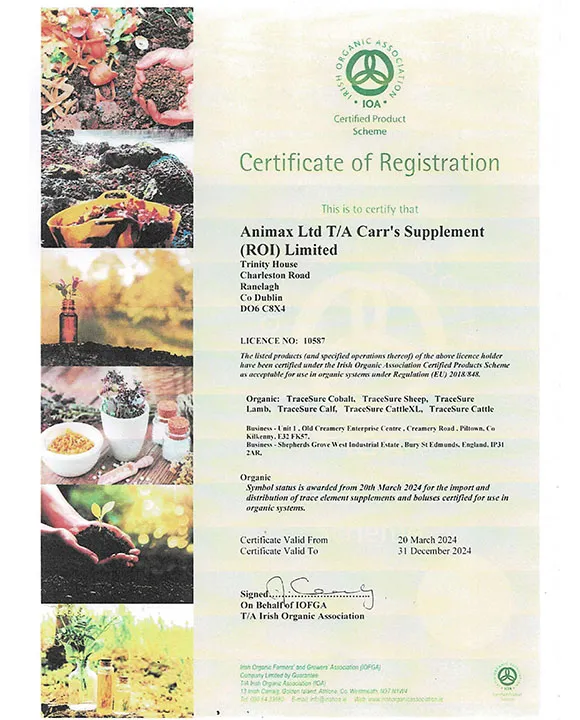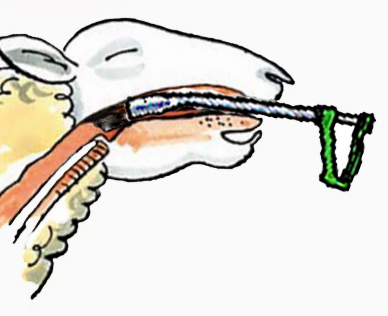Tracesure Sheep With Copper is a supplementary bolus that supplies sheep and lambs with cobalt, selenium, iodine and copper.
QUANITY:
Currently out of stock
Contact us >
Tracesure Sheep With Copper is a supplementary bolus that supplies sheep and lambs with cobalt, selenium, iodine and copper. The boluses are designed to use a unique slow release leeching system that will slowly release the minerals over a six month period.
Tracesure Sheep With Copper boluses are ideal for supplementing sheep that require copper and must not be used for copper sensitive breeds as it can be fatal.
These boluses can improve your flocks health, performance, vitality and reduce your concentrate use.
The Tracesure Sheep With Copper is perfect for use to meet the new sheep scheme pre weaning mineral requirements. These boluses should be administered using the Allsure Sheep Metal Balling Gun.
Active Substance
Cobalt, Iodine, Selenium and Copper
Target Species
Sheep and lambs
Treats and Controls
An imbalance in available minerals as well as iodine. Slow release over 6 months
Application Method
Allsure Sheep Metal Balling Gun.
Withdrawal Period
None
Dosage
1 Bolus and 1 Capsule per animal.
![]()
| Content Per Bolus | Supplied per Day | |
| Cobalt | 185 mg | 1.03mg |
| Iodine | 660 mg | 3.67mg |
| Selenium | 100 mg | 0.56mg |
| Copper | 4 g | 19.33 |
There are significant advantages to using boluses over drenches. Drenches have to be administered every few weeks where as a single bolus can last up to four months. This fact alone can save time, effort and money for the farmer. Drenches can also cause a sudden spike in the minerals being administered which in some cases can be damaging to the animal, boluses use a slow release system which ensures the animal is only being administered the correct daily amount of cobalt, selenium and iodine.
Iodine Deficiency in Sheep:
A severe deficiency of iodine causes a lack of essential thyroid hormone production and the thyroid gland enlarges. The enlarged thyroid gland is called goitre. The swelling occurs in the throat area and can be as large as an orange. Goitre is mainly a disease of lambs and kids, it rarely occurs in calves. Goats have a higher requirement for iodine than other livestock. Supplementing ewes with the trace element iodine can prevent goitre and potentially fatal deficiency complications.
Cobalt Deficiency in Sheep:
Cobalt has an important biological role as a constituent of vitamin B12 which is manufactured by micro-organisms in the first stomach (rumen). Cobalt deficiency (pine) occurs where there are low soil cobalt concentrations which may be further complicated by PGE which causes diarrhoea thereby interfering with the absorption of vitamin B12.
Signs of cobalt deficiency are most commonly observed in weaned lambs at pasture during late summer/autumn, and include lethargy, reduced appetite, poor quality wool with an open fleece, small size and poor body condition despite adequate nutrition. There may be tear staining of the cheeks, and pale mucous membranes (eyes) develop after several months.
Cobalt-deficient sheep may fail to respond well to vaccinations and be more susceptible to clostridial diseases (for example pulpy kidney) and pasteurellosis (pneumonia).In severe cases of cobalt deficiency (referred to as ovine white liver syndrome) lambs present with nervous signs including depression, head pressing, and aimless wandering. Cobalt deficiency is much less common in adults but is reported to cause reduced fertility and poor mothering ability but these signs may be more related to generalised low body condition scores.
Selenium Deficiency in Sheep:
Often referred to as white muscle disease, nutritional muscular dystrophy, and stiff lamb disease. White muscle disease occurs in the UK with recognised risk factors such as feeding home grown cereals and root crops, and incorrectly mineralised rations. Selenium deficiency occurs in soils of certain geographic areas world-wide leading to pasture/crop deficiency. Certain root crops are known to be low in both selenium and vitamin E. Feeding grain treated with propionic acid may increase the risk of white muscle disease.
Copper Deficiency in Sheep:
Copper deficiency in sheep is a problem that happens when sheep don't get enough copper in their food. Copper is a special kind of mineral that the body needs just a little bit of. It helps with important things like making blood cells, strong bones, and fighting off diseases.
When sheep don't have enough copper, they can face several issues:
Not Enough Blood: Without enough copper, sheep might not have enough healthy blood cells, which can make them feel tired and weak.
Bones and Hooves Trouble: Copper is like a building block for bones and hooves. When there's not enough, their bones and hooves might become weak and cause problems when they walk.
Having Babies Problems: Copper is important for making babies and helping them grow inside the mommy sheep. If there's not enough copper, sheep might have trouble having babies or the babies might not grow properly.
Getting Sick Easier: Copper also helps sheep stay healthy by fighting off sickness. When they don't have enough, they can get sick more easily.
Changing Looks: Copper even helps give sheep their colour and wool quality. Not enough copper can make their coats look different.

Sheep Bolus
The administration technique is a vital part of ensuring that the bolus does its job effectively.
Make sure that the sheep are properly restrained and cannot leap around when they are being given the bolus so that they are able to swallow correctly.
Sheep can also suffer serious injury, or even death, if they are unrestrained and the gun penetrates the tissues at the back of the mouth.
Place a hand under the head and tilt slightly to the side.
Slot the nozzle in the gap between molar and incisor teeth and then over the back of the tongue.
If the operative just puts the bolus into the mouth, it may be rejected by the sheep.

Here at Agridirect we have joined forces with Parcelforce to ensure all packages are delivered promptly and safely to you. We ship to all ares within mainland United Kingdom and Northern Ireland. Deliveries take place Monday to Friday excluding bank holidays. Once your order has been dispatched from our warehouse you will be notified by email. If there is a delay with your order for any reason you will be contacted immediately. Orders take 2-4 Working days to be delivered. Some products have an extended delivery time, this is noted on the individual products.
| Country | Orders Under £100 | Orders Over £100 |
| United Kingdom (Mainland Only) | £5.00 | £0.00 |
| Northern Ireland | £5.00 | £0.00 |
There may be an addition charge on certain bulky items. This charge will be clearly marked on an applicable products and will be explained on the checkout page before payment has been made.
We’re sorry your purchase didn’t work out. But don’t worry; we have a great returns policy to help you out.
All purchases can be returned to us within 14 days of delivery and returned goods must be received within 14 days from the date you informed us of the return.
Items returned during the cooling-off period must be in a resalable condition, which means:
If we discover goods have been used or there has been a loss in value of the goods due to damage to the goods or the packaging, while in your care or whilst being returned to us, we will reduce the amount refunded, which may amount to the full cost of the product, to cover loss of value of goods.
All returns should be complete which includes boxes, manuals and accessories that may have been included with the order.
All returns must be packaged appropriately for shipping, we will not accept responsibility for damages or loss which occur during shipping of a return product.
We accept no responsibility for goods damaged or lost while in transit to us.
The cost of the return, including all packaging and freight, lies solely with the consumer.
First off, if you have received a damaged electrical product from us, do not plug it in. Any electrical products that are plugged in are deemed ‘as used and accepted’ and are not accepted as returns. All damages must be reported to us via phone or email within 24hours of receipt of goods. Please ensure you check your items upon delivery.
How do I begin the returns process?
If you wish to begin the return process, please email us at sales@agridirect.co.uk and ensure the following information is included in your email. Your name, phone number, Order id, the item you wish to return, reason for return and if the product is damaged we require photos of the product.
Once you have sent us all required information a member of our team will assess your claim and will contact you as soon as possible. Please hold off on returning products until a member of our team has called you to confirm.
All returns must be accompanied with a fully filled out returns form which can be downloaded here.
All returns must be the complete product which includes boxes, manuals and accessories that may have been include with the order.
All returns must be packaged appropriately for shipping, we will not accept responsibility for damages or loss which occur during shipping of a return product.
Address: Please ship the product to the following address: Agridirect UK, C/O Parcel Club, 6 Derrintony Road, Derrylin, Co Fermanagh, BT92 9EZ
Once the returned product has been returned to us and fully inspected a refund will be issued.
Please Note: A typical timeline for a refund to show in your account is up to 10 working days from the date processed, depending on your bank.
Would you like to send this voucher to the recipient via email?
Yes No